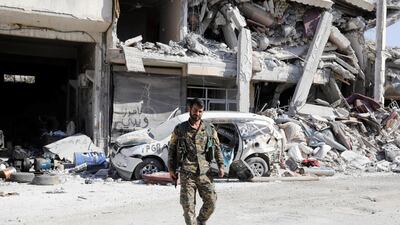The ancient mud brick walls circling Raqqa's deserted old city are almost the only structure still intact. Inside, shops and homes spill crumbling concrete onto either side of the narrow roads, for block after block.
Fighting between US-backed militias and ISIL in its former stronghold in Syria has left the mosques and minarets peppered with machine-gun fire while air strikes have flattened houses. No building is untouched.
"The old clock tower could be heard from outside the walls once. It's damaged now. It's silent," Mohammed Hawi, an Arab fighter from Raqqa, said at a nearby home occupied by the Syrian Democratic Forces alliance (SDF).
Raqqa, where ISIL plotted attacks abroad during its three-year rule, is close to being captured after an offensive lasting months and backed by US air cover and special forces. But driving militants out has caused destruction that officials say will take years and cost millions of dollars to repair.
The nascent Raqqa Civil Council, set up to rebuild and govern Raqqa, faces a huge task. It says aid from countries in the US-led coalition against ISIL is so far insufficient.
Raqqa's political future is uncertain, as it comes under the sway of Kurdish-led forces which neighbour Turkey opposes, and the city is coveted by Syrian president Bashar,Al Assad. And that uncertainty is partly what has made coalition countries hesitate, diplomats say.
But failure to quickly return services to the city that was once home to more than 200,000 people, mostly now displaced, risks unrest, they warn.
"Infrastructure is completely destroyed, water, electricity networks, bridges. There's not a single service functioning," said Ibrahim Hassan, who oversees reconstruction for the Raqqa council at its headquarters in nearby Ain Issa. "We gave our city as a sacrifice for the sake of defeating terrorism. It's the world's duty to help us."
A major bridge leading into eastern Raqqa lies collapsed after a coalition air strike. Beyond it, damaged water towers and the skeletons of teetering residential blocks dot the skyline. Awnings hung by militants to hide their movements flap in the wind.
BODIES UNDER RUBBLE
Senior council member Omar Alloush estimates at least half the city is completely destroyed.
"There are also bodies under rubble, of civilians and terrorists. These need reburying to avoid disease outbreaks," he said.
Amnesty International has said the US-led campaign, including air strikes, has killed hundreds of civilians trapped in Raqqa. Residents have reported civilian deaths, but it is difficult to establish how many people have died. The coalition says it does all it can to avoid civilian casualties. But the city is densely built up and militants fire from the cover of homes, which are often targeted by air raids.
Council officials said with the battle still raging in a small, encircled area of the city centre and countless explosives rigged by militants in areas they abandoned, reconstruction has not yet begun.
"The focus is on emergency aid, food and water, de-mining," Mr Hassan said.
The council wants to get services up and running as soon as possible, but has limited capacity and is staffed by volunteers. At its headquarters the offices of several departments consist of a single desk in a shared room.
"Support from the international community has improved and we feel less isolated, but it's been modest," Mr Hassan said.
The United States delivered several bulldozers and other vehicles to the council to clear debris recently. In all, 56 are due to arrive.
"Even 700 wouldn't be enough," Mr Alloush said.
POLITICAL OBSTACLES
Raqqa council volunteers have said they told the coalition it will take 5.3 billion Syrian pounds (about Dh36.7 million) a year to restore power and water supplies, roads and schools.
"Groups that took over Raqqa in 2013 didn't run it well," a Western diplomat in the region said, referring to Syrian insurgents who seized the city from President Assad's forces earlier in the six-year-old civil war, before ISIL arrived. "That's partly what allowed Daesh (ISIL) to take over. If there's a gap in humanitarian assistance and no effective local governance structure, the risk of future violence increases."
Raqqa council, which is made up of local engineers, teaches and doctors, said coalition countries were reluctant to help.
"We've suffered from bureaucracy in the decision making process for foreign aid," Mr Hassan said.
Some coalition countries were concerned about relations with NATO member Turkey over support for a governing body perceived to be allied to Kurdish militia, the diplomat said.
The SDF, which for now controls much of Raqqa, is spearheaded by the Kurdish YPG militia, which is considered an enemy by Ankara which is fighting its own Kurdish insurgency. Turkey opposes the YPG's role in capturing Raqqa.
Council officials say Raqqa will be governed independently of a self-run administration for northeast Syria that is dominated by Kurds, but is expected to have close relations with it. The extent of those relations is to be decided by elected officials once elections can be held.
Another diplomat in the region said there was also some concern over whether the council properly represents the ethnic make-up of mostly Arab Raqqa. Several prominent council members are Kurdish.
There is also uncertainty over whether Raqqa will remain allied to the self-run parts of northern Syria, or if it would fall back to Assad in future upheaval. President Assad has sworn to retake the entire country.
For now, with Turkey's borders closed to SDF-controlled areas, aid to Raqqa comes via a longer route through Iraq's Kurdish region. Raqqa council says it may have to be self-sufficient.
"We're waiting for help to repair the east bridge," co-president Leila Mustafa, a civil engineer, said. "If it doesn't arrive soon, we'll begin ourselves, using any means we have."

